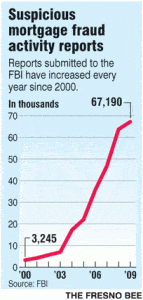 Patty and Jody Farmer were hooked when a Rancho Cordova-based company offered to help refinance their adjustable-rate mortgage, which was about to become unaffordable.
Patty and Jody Farmer were hooked when a Rancho Cordova-based company offered to help refinance their adjustable-rate mortgage, which was about to become unaffordable.
But after paying the company nearly $8,000 — and following its advice to stop making mortgage payments — the Farmers didn’t get a new mortgage. Instead, their lender foreclosed on their Fresno home of 11 years, and they were forced to move out.
Now the state is suing the company that authorities say scammed the Farmers.
“I do know that there are people out there that do take advantage of homeowners, but you never think it’s going to happen to you,” said Patty Farmer. “It was terrible. It just made me feel like it was hard to trust anybody again.”
The Farmers are among thousands of California residents who have fallen victim to the mortgage scams that have proliferated during the economic downturn. Some are committed by real companies, and some are the work of criminals.
Warning signs
You may be dealing with a mortgage scam if:
— You’re advised not to contact your lender.
— There’s a fee up front.
— You’re advised to stop paying your mortgage.
— The company guarantees to stop a foreclosure or get a loan modified.
Sources: Aspera Housing Inc., ClearPoint Credit Counseling Solutions, Loan Modification Scam Prevention Network
Mortgage fraud has exploded over the last 10 years amid the housing boom and bust. When the real estate market was rising, unscrupulous loan agents often would falsify mortgage applications so borrowers could qualify — and they could reap big commissions.
When the bubble burst and home values plummeted, the fraud continued, with perpetrators simply changing their tactics to prey on those who needed help keeping their homes.
Soaring fraud reports suggest the bad economy is even more profitable for criminals.
“Mortgage fraud keeps reinventing itself,” said Randall Guerra, director of housing and counseling services at Aspera Housing Inc., a housing counseling agency in Fresno. “The profiteers are jumping on everything.”
Read more: Fresno Bee
For all your real estate needs
Call John J. O’Dell
Real Estate Broker
(530) 263-1091
DRE #00669941
